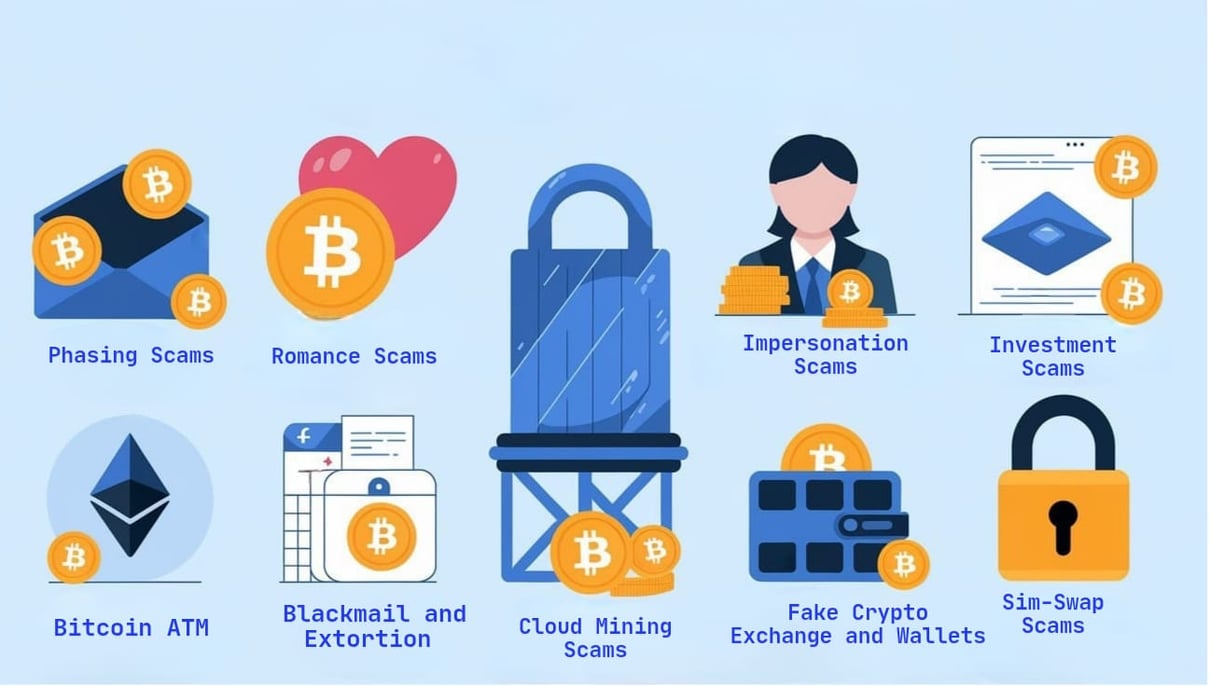Common Cryptocurrency Scams
Cryptocurrency provides numerous investment and trading opportunities, but it also draws scammers eager to exploit unsuspecting users. This blog explores common cryptocurrency scams, including phishing, romance, impersonation, investment scams, and more. Gain practical tips and insights to safeguard your investments and stay secure in the crypto world. #Cryptocurrency #CryptoScams #Cybersecurity #CryptoSafety #InvestmentScams #Phishing #BlockchainTechnology #DigitalSecurity #StaySafe
CYBERSECURITYCRYPTO SCAMS AWARENESS
1/26/20252 min read


Beware of Common Cryptocurrency Scams
Cryptocurrency is exciting and offers many opportunities for investment and trading. However, it also attracts scammers looking to take advantage of unsuspecting users. Here are some common cryptocurrency scams you should watch out for:
1. Phishing Scams
Phishing scams involve scammers creating fake websites, emails, or social media profiles that look like legitimate ones. Their goal is to steal your personal information, such as passwords, private keys, or wallet information. Always double-check the URLs and email addresses before entering any sensitive information.
2. Romance Scams
In romance scams, scammers create fake profiles on dating sites and social media to build a relationship with you. Once they gain your trust, they will convince you to send them cryptocurrency. Be cautious when someone you’ve met online asks for money or crypto, especially if the relationship is new.
3. Impersonation Scams
Scammers often pretend to be someone you trust, like a celebrity, government official, or a well-known company. They will contact you through social media, emails, or calls, asking for cryptocurrency. Always verify the identity of the person before making any transactions.
4. Investment Scams
Investment scams promise high returns on investments in fake cryptocurrencies or initial coin offerings (ICOs). These scammers create attractive websites and marketing materials to lure you in. Be wary of promises of guaranteed returns or pressure to invest quickly. Research the project thoroughly before investing.
5. Blackmail and Extortion
Scammers may claim to have compromising information about you and demand payment in cryptocurrency to keep it private. They often use fear and threats to make you pay. Do not give in to these demands and report the scam to the authorities.
6. Cloud Mining Scams
In cloud mining scams, scammers offer fake cloud mining services where they promise to mine cryptocurrency for you in exchange for a fee. However, they never deliver any returns. Be cautious of cloud mining services that seem too good to be true and do your research before investing.
7. Fake Crypto Exchanges and Wallets
Scammers create fake cryptocurrency exchanges or wallets that look legitimate. When you try to use them, they steal your funds. Always use well-known and reputable exchanges and wallets to ensure your cryptocurrency is safe.
8. SIM-Swap Scams
In SIM-swap scams, scammers trick mobile carriers into transferring your phone number to their device. They then use your phone number to access your cryptocurrency accounts and steal your funds. Protect your accounts with two-factor authentication (2FA) and be cautious if you lose phone service unexpectedly.
How to Protect Yourself
Always double-check URLs and email addresses.
Never share your private keys or sensitive information.
Be cautious of unsolicited messages from strangers.
Research thoroughly before investing in any project.
Use reputable exchanges and wallets.
Enable two-factor authentication on your accounts.
Keep your software and devices up to date.
By staying informed and vigilant, you can protect yourself from these common cryptocurrency scams. Remember, if something sounds too good to be true, it probably is. Stay safe and happy investing!
